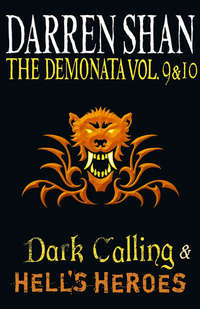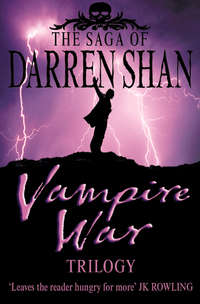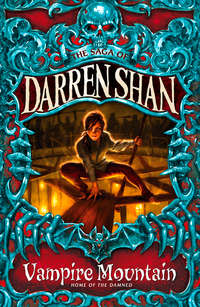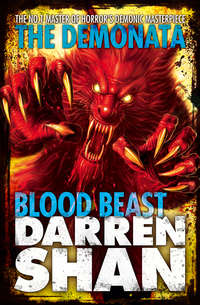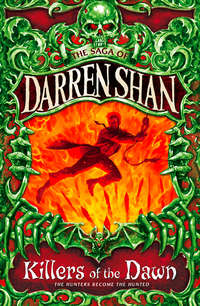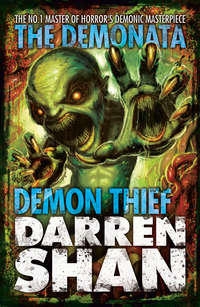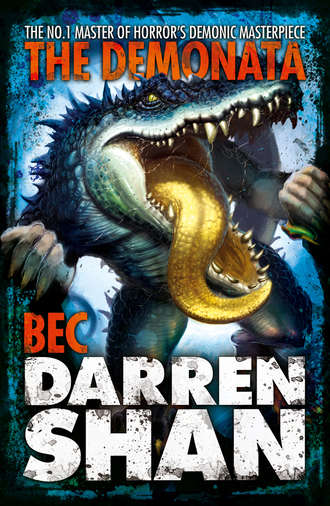
Полная версия
Bec
“Aye,” Goll sneers. “You hit it with a spear. In the back. While it was running away.” He claps slowly. “A most courageous deed.”
Connla hisses. His hand goes for a spear. Goll snatches for his axe.
“Enough!” Conn barks. He’s been keeping an eye on the pair. He always seems to be on hand when Connla’s on the point of getting into trouble. The king steps forward, scowling. “Isn’t it bad enough that we have to fight demons every night, without battling among ourselves too?”
“He questioned my courage,” Connla whines.
“And you called him an old goat,” Conn retorts. “Now shake hands and forget it. We don’t have time for quarrels. Be men, not children.”
Goll sighs and extends a hand. Connla takes it, but his face is twisted and he shakes quickly, then returns to the small group of men who are always huddled close around him. As they leave, he starts to tell them again about the demon he speared and how he’s certain the blow was fatal, boasting of his great skill and courage.
→ Later. The gate of the rath is open. The cows and sheep have been led out to graze. Demons can only come at night, gods be thanked. If they could attack by day as well, we’d never be able to graze our animals or tend our crops.
I go for a walk. I like to get out of the ring fort when my duties allow, stretch my legs, breathe fresh air. I stroll to a small hill beyond the rath, from the top of which I’m able to look all the way across Sionan’s river to the taller hills on the far side. Many of the men have been to those hills, to hunt or fight. I’d love to climb the peaks and see what the world looks like from them. But it’s a journey of many days and nights. No chance of doing that while the demons are attacking. And for all we know, the demons will always be on the attack.
I feel lonely at times like these. Desperate. I wish Banba was here. She was more powerful than me and had the gift of prophecy. She died last winter, killed by a demon. Got too close to the fighting. Struck by a Fomorii with tusks instead of arms. It took her two nights and days to die. I haven’t learnt any new magic since then. I’ve worked on the spells that I know, to keep in shape, but it’s hard without a teacher. I make mistakes. I feel my magic getting weaker, when it should be growing every day.
“Where will it end, Banba?” I mutter, eyes on the distant hills. “Will the demons keep coming until they kill us all? Are they going to take over the world?”
Silence. A breeze stirs the branches of the nearby trees. I study the moving limbs, in case I can read a sign there. But it just seems to be an ordinary wind — not the Otherworldly voice of Banba.
After a while I bid farewell to the hills and return to the rath. There’s work to be done. The world might be going up in flames, but we have to carry on as normal. We can’t let the demons think they’ve got the beating of us. We dare not let them know how close we are to collapse.
→ After a quick meal of bread soaked in milk, I start on my regular chores. Weaving comes first today. I’m a skilled weaver. My small fingers dart like eels across the loom. I’m the fastest in the rath. My work isn’t the best, but it’s not bad.
Next I fetch honey from the hives. The bees were Banba’s. She brought them with her when she settled in the rath many years ago. They’re my responsibility now. I was scared of them when I was younger, but not any more.
Nectan returns from a fishing trip. He slaps two large trout down in front of me and tells me to clean them. Nectan’s a slave, captured abroad when he was a boy. Goll won him in a fight with another clan’s king. He’s as much a part of our rath now as anyone, a free man in all but name.
I enjoy cleaning fish. Some women hate it, because of the smell, but I don’t mind. Also, I like reading their guts for signs and omens, or secrets from my past. I haven’t divined anything from a fish’s insides yet but I live in hope.
The women grind wheat in stone querns, to make bread or porridge. Some work on the roofs of the huts, thatching and mending holes. I’d love to build a hut from scratch, draw a circle on the ground and raise it up level by level. There’s something magical about building. Banba told me that all unnatural things – clothes, huts, weapons – are the result of magic. Without magic, she said, men and woman would be animals, like all the other beasts.
Most of the men are sleeping, but a few are cleaning their blades and still discussing the night’s battle. It was one of our easier nights. The attack was short-lived and the demons were few in number. Some reckon that’s a sign that the Fomorii are dying out and returing to the Otherworld. But they’re dreamers. This war with the demons is a long way from over. I don’t need fish guts to tell me that!
Fiachna is working by himself, straightening crooked swords, fixing new handles to axes, sharpening knives. We’re the only clan in the tuath with a smith of its own. That was Goll’s doing when he was king. Most smiths wander from clan to clan, picking up work where they find it. Goll figured that if we paid a smith to settle, folk from nearby raths, cathairs and crannogs would come to us when their weapons and tools needed repairing, rather than wait for a smith to pass by. He was right. Our rath became an important focal point of the tuath — until the attacks began. The demons put paid to a lot of normal routines. Nobody travels now, unless it’s to flee the Fomorii.
When I get a chance, I walk over to where Fiachna is hammering away at a particularly stubborn blade. I watch him silently, playing with a lock of my short red hair, smiling shyly. I like Fiachna. He’s shorter than most men, and slim, which is odd for a smith. But he’s very skilled. Stronger than he looks. He swings heavy hammers and weapons with ease. If I could marry, I’d like to marry Fiachna. If nothing else, we’re suited in size. Maybe it’s because of the name Goll gave me, or perhaps it’s coincidence, but I’m one of the smallest girls in the rath.
But it’s not just his size. I like his kind nature and gentle face. He has a short beard – dark-blond, like his hair – which doesn’t hide his smile. Most of the men have beards so thick you can’t see their mouths, so you never know if they’re smiling or frowning.
I often dream of being Fiachna’s wife, bearing his young, fighting demons by his side. But it won’t happen. I’m almost of marrying age – my blood came a couple of years ago, earlier than in most girls – but I can never wed. Magic and marriage don’t mix. Priestesses and druids lose their power if they love.
Sometimes it makes me sad, thinking about not being able to marry. I find myself wishing I could be normal, that the magic would fade from me, leaving me free to wed like other girls my age. But those are selfish thoughts and I try hard to drive them away. My people need my magic. It’s not the strongest in the world and I’m in dire need of a teacher to direct me. But it’s better than having no magician in the rath at all.
Fiachna looks up and catches me staring. He smiles, but not in a teasing way, not like Connla would smirk if he saw me looking at him. “You did well with the bees last night,” Fiachna says in his soft, lilting voice, more like a fairy’s than a human’s.
I feel my face turn red. “It wasn’t much,” I mutter, sticking my big right toe out over the lip of its sandal and stubbing the ground.
“You’re getting stronger,” Fiachna says. “You’ll be a powerful priestess soon.”
We both know that’s a lie but I love him for saying it. I give a big smile, like a baby having its tummy tickled. Then Cera calls me and tells me to give her a hand dyeing wool. “Do you want me to help you with the weapons?” I quickly ask Fiachna, hoping for an excuse to stay with him. “I can bless the blades. Put magic in them. Make them stronger.”
Fiachna shakes his head. “There’s no need. I’m almost finished. I’ll work on farming tools in the afternoon.”
“Oh.” I try not to let my disappointment show. “Well, if you need me, call.”
Fiachna nods. “Thank you, Bec. I will.”
Simple words, but as I dip strands of wool in a vat full of blue dye, they ring inside my skull for ages, making me smile.
→ In the afternoon, while the men are stirring in their sleep and the women are working on the evening meal, a lookout yells a warning. “Figures to the north!”
The rath comes on instant alert. Demons have never attacked this early – there’s at least two hours of daylight left – but we’ve learnt not to take anything for granted. Men are out of their huts and reaching for weapons within seconds. Female warriors throw away their looms, combs, tools and pots, and hurry to the rampart. Those outside the rath are summoned in. They come hastily, anxiously driving the animals ahead of them.
Conn emerges from his hut at the centre of the village, eyes crusty, looking less worried than anyone else. A king should never look scared. He climbs the rampart and strides to the lookout. Stares off into the distance. Connla shouts at him from the ground, “Demons?”
“Doesn’t look like it,” Conn grunts. “Human in shape. But maybe they’re dead.”
The dead often come back to haunt us. The demons get the bodies from dolmens or wedge tombs. They use dark magic to fill the corpses with evil life, sometimes stitching bits from various victims together. We’re not sure why they do it. Maybe some of them can’t make bodies of their own and have to steal the bones of our dead. We’ve gone to all the local tombs that we know of over the last year, burning the corpses. But there are many hidden and forgotten tombs. The demons are always finding new bodies. At times, it seems like there’s more dead than living in the world.
Conn watches for several minutes, more of the clan joining him, shading their eyes with their hands, studying the approaching shapes. I see the more hawk-eyed among them – Ronan, Lorcan, Ena – relax and I know it’s all right. But nobody says anything before Conn. It’s his place to give the all-clear.
Finally, Conn smiles. “Not to worry,” he says. “They’re human. Alive.”
Calm settles over the rath and everyone returns to their normal routine. We’re curious about the strangers but we’ll find out all about them in good time. No point standing around guessing, when there’s work to be done.
→ They arrive half an hour later, ragged and weary from battle and the road. Four men, three women and four children. We know them — the MacCadan. When the demons first attacked, Conn sent an envoy to Cadan and asked if he was open to an alliance. There had been bad blood between us but Conn wanted to make peace, so we could fight the demons together. Cadan refused. He said his people could stand alone. We haven’t heard from them since then.
Cadan’s not among the eleven. The leader’s an old warrior – even older than Goll – who limps awkwardly and trembles pitifully when he’s not on the move. He announces himself at the gate as Tiernan MacCadan and requests entrance. The eleven trudge into the rath and present themselves miserably, heads low.
Conn goes straight to Tiernan and clasps his arms warmly, welcoming him. He asks if they’re hungry or thirsty. Tiernan says they are and Conn gives orders for a feast to be prepared. The women set to the task immediately.
Conn leads our guests to the area in front of his hut and lets them settle. They haven’t brought much – spare clothes, a few weapons, some tools – but it’s plain this is all they have. I know what’s happened, just as Conn and everybody else knows, but nobody says anything. We let Tiernan explain.
The demons overwhelmed them. The end had been coming for a long time but they held out stubbornly, even past the point where they knew it was folly. Their best warriors had fallen to the foul Fomorii, their children had been taken, their animals slain, their crops destroyed.
“Many argued against staying,” Tiernan sighs. “We said it was madness, that we’d perish if we didn’t join forces with our neighbours. But Cadan said we’d lose face if we retreated. He was a proud man, not for bending. But eventually, like all who refuse to bend, he snapped. The Fomorii took him last night, along with three others. This morning, before the sun had risen, we packed our goods and marched here. We hope to fight with you, to offer whatever aid we can, to…”
He trails to a halt. Two of the men are seriously injured and Tiernan’s no chick. One of the women is a warrior but the other two aren’t. And the children are too young to fight. Tiernan’s trying to make it sound like we need them, that they can make a difference. But really they’re just looking for sanctuary. Taking them in would be a mercy, not a merger.
The men of the rath are sitting in a circle around the newcomers. I’m on the outskirts, only allowed this close in case any magical matters arise. I see doubt on the faces of most. We’re already cramped. We’d need to expand the fort again to comfortably hold eleven more people. That’s hard to do when you’re under attack from demons most nights.
Tiernan senses the mood and speaks rapidly. “We could build our own huts. Our women are skilled, the children too. We’d depend on your hospitality for a few weeks but we’d work every hour we can to set up on our own. We wouldn’t be a burden. And when it comes to fighting, we’re stronger than we look. Even the youngest child has drawn blood. We–”
“Easy, friend,” Conn interrupts. “We’re pleased you came to us when there are so many other clans you could have gone to. It’s an honour to receive you. I’m sure you will be of great help.”
Tiernan blinks. He hadn’t expected such a gracious welcome. After the years of feuding, it’s more than he dared hope. Tears well in his eyes but he shakes them away and smiles. “You’re a true king,” he compliments Conn.
“And, I hope, a true friend,” Conn replies, then barks orders for beds to be made for the MacCadan. Some don’t like it – Connla’s face is as dark as a winter cloud – but nobody’s going to argue with our king, certainly not in front of guests. So they obey without question, shifting beds, clothes and goods from one hut to another, bunching up even closer than before, squashing together, making room for the new additions to our demon-tormented clan.
THE BOY
→ Preparations for the feast are at an advanced stage, and the sun is close to setting, when there’s a call from another lookout. “I see someone in the distance running towards us!”
Conn raises an eyebrow at Tiernan. They’ve been talking about their battles with the demons. I’ve sat in close attendance. Our seanachaidh fled not long after the attacks began, so I’ve been charged with keeping the history of the clan. I’m no natural storyteller but I’ve a perfect memory.
“It’s not one of ours,” Tiernan says. “We brought all our living with us.”
“Is it a demon?” Conn shouts at the lookout.
“It doesn’t look like one,” comes the reply. “I think it’s a boy. But the speed at which he’s running… I’m not sure.”
Conn returns to the rampart with Tiernan and a few of our warriors. I slip up behind them. I normally avoid the exposure of the higher ground, but a lone demon in daylight can’t pose much of a threat.
As the figure races closer, we see that it’s a boy, my age or slightly older, running incredibly fast, head bobbing about strangely. He lopes up to the gate, ignoring Conn’s shouts to identify himself, then stops and looks at us dumbly. Dark hair and small eyes. He smiles widely, even though Conn is roaring at him, threatening to stick a spear through his heart if he doesn’t announce his intentions. Then he sits, picks a flower and plays with it.
Conn looks angry but confused. “A simpleton,” he grunts.
“It could be a trap,” Tiernan mutters.
“Demons don’t send humans to lay traps,” Conn disagrees.
“But you saw how fast he ran,” Tiernan says. “And he doesn’t look tired. He’s not even sweating. Maybe he’s not human.”
“Bec,” Conn calls, “do you sense anything?”
I close my eyes and focus on the boy. Demons have a different feel to humans. They buzz with the power of their own world. There’s a flicker of that about this child. I start to tell Conn but then something strange happens. I sense a change in the boy. Opening my eyes, I see that the light around him is different. It’s like looking at him through a thick bank of mist. As I squint, I realise the boy is no longer there. Instead, I’m staring at my mother.
There’s no mistaking her. I’ve seen her so many times in my perfect memories. She looks just like she did on the day she gave birth to me — the day she died. Haggard, bone-thin, dark circles under her eyes, stained with blood. But love in her eyes — love for me.
As I stare, numb with wonder – but no fear – my mother turns and points west, keeping her eyes on mine. She says something but her words don’t carry. With a frown, she jabs a long finger towards the west. She starts to say something else but then the mist clears. She shimmers. I blink. And I’m suddenly looking at the boy again, playing with his flower.
“Bec,” Conn is saying, shaking me lightly. “Are you all right?”
I look up, trembling, and think about telling Conn what I saw. Then I decide against it. I’ve never had a vision before. I need time to think about it before I discuss it with anyone. Focusing on the boy, I control my breathing and try to calm my fast heartbeat.
“I th-think he’s hu-human,” I stutter. “But not the same as us. There’s magic in him. Maybe he’s a druid’s apprentice.” That’s a wild guess, but it’s the closest I can get to explaining what’s different about him.
“Does he pose a threat?” Conn asks.
A dangerous question — if I answer wrongly, I’ll be held responsible. I think about playing safe and saying I don’t know, but then the boy pulls a petal from the flower and slowly places it on his outstretched tongue. “No,” I say confidently. “He can’t harm us.”
The gate is opened. Several of us spill out and surround the boy. I’ve been brought along in case he doesn’t speak our language. A priestess is meant to have the gift of tongues. I don’t actually know any other languages but I don’t see the need to admit that, not unless somebody asks me directly — and so far nobody has. I keep hoping he’ll change and become my mother again, but he doesn’t.
The boy is thin and dirty, his hair thick and unwashed, his knee-length tunic caked with mud, no cloak or sandals. His eyes dart left and right, never lingering on any one spot for more than a second. He’s carrying a long knife in a scabbard hanging from his belt but he doesn’t reach for it or show alarm as we gather round him.
“Boy!” Conn barks, nudging the boy’s knee with his foot. No reaction. “Boy! Who are you? What are you doing here?”
The boy doesn’t answer. Conn opens his mouth to shout again, then stops. He looks at me and nods. Licking my lips nervously, I crouch beside the strange child. I watch him play with the flower, noting the movements of his eyes and head. I no longer think he’s a druid’s assistant. Conn was right — he’s a simpleton. But one who’s been blessed in some way by the gods.
“That’s a nice flower,” I murmur.
The boy’s gaze settles on me for an instant and he grins, then thrusts the flower at me. When I take it, he picks another and holds it above his head, squinting at it.
“Can you speak?” I ask. “Do you talk?”
No answer. I’m about to ask again, when he shouts loudly, “Flower!”
I jump at the sound of his voice. So do the men around me. Then we laugh, embarrassed. The boy looks at us, delighted. “Flower!” he shouts again. Then his smile dwindles. “Demons. Killing. Come with.” He leaps to his feet. “Come with! Run fast!”
“Wait,” I shush him. “It’s almost night. We can’t go anywhere. The demons will be on the move soon.”
“Demons!” he cries. “Killing. Come with!” He grabs my hand and hauls me up.
“Wait,” I tell him again, losing my patience. “What’s your name? Where are you from? Why should we trust you?” The boy stares at me blankly. I take a deep breath, then ask slowly, “What’s your name?” No answer. “Where are you from?” Nothing. I turn to Conn and shrug. “He’s simple. He probably escaped from his village and–”
“Come with!” the boy shouts. “Run fast! Demons!”
“Bec’s right,” Connla snorts. “Why would anyone send a fool like this to–”
“Run fast!” the boy gasps before Connla can finish. “Run fast!” he repeats, his face lighting up. He tears away from us, breaks through the ranks of warriors as if they were reeds and races around the rath. Seconds later he’s back, not panting, just smiling. “Run fast,” he says firmly.
“Do you know where you’re from, Run Fast?” Goll asks, giving the boy a name since he can’t provide one himself. “Can you find your way back to your people?”
For a moment the boy gawps at Goll. I don’t think he understands. But then he nods, looks to where the sun is setting and points west. “Pig’s trotters,” he says thoughtfully. For a second I see my mother pointing that same way again, but this is just a memory, not another vision.
Goll faces Conn. “We should bring him in. It’ll be dark soon. We can question him inside, though I doubt we’ll get much more out of him.”
Conn hesitates, judging the possible danger to his people, then clicks his fingers and leaves the boy to his men, returning to the fireside with Tiernan, to discuss this latest turn of events.
→ Run Fast isn’t big but he has the appetite of a boar. He eats more than anyone at the feast but nobody minds. There’s something cheering about the boy. He makes us all feel good, even though he can’t talk properly, except to explode every so often with “Demons!” or “Come with!” or – his favourite – “Run fast!”
As Goll predicted, Run Fast isn’t able to tell us any more about his clan, where he lives or how great their need is. Under normal circumstances he’d be ignored. We’ve enough problems to cope with. But the mood of the rath is lighter than it’s been in a long while. The arrival of the MacCadan has sparked confidence. Even though the eleven are more of a burden than a blessing, they’ve given us hope. If survivors from other clans make their way here, perhaps we can build a great fort and a mighty army, keep the demons out forever. It’s wishful, crazy thinking, but we think it anyway. Banba used to say that the desperate and damned could build a mountain of hope out of a rat’s droppings.
So we grant Run Fast more thought than we would have last night. The men debate his situation, where he’s from, how long it might have taken him to come here, why a fool was sent instead of another.
“His speed is the obvious reason,” Goll says. “Better to send a hare with half a message than a snail with a full one.”
“Or maybe the Fomorii sent him,” Tiernan counters, his bony, wrinkled fingers twitching with suspicion. “They could have conquered his clan, then muddled his senses and sent him to lure others into a trap.”
“You afford them too much respect,” Conn says. “The Fomorii we’ve fought are mindless, dim-witted creatures.”
“Aye,” Tiernan agrees. “So were ours to begin with. But they’ve changed. They’re getting more intelligent. We had a craftily hidden souterrain. One or two would find their way into it by accident every so often, but recently they attacked through it regularly, in time with those at the fence. They were thinking and planning clearly, more like humans in the way they battled.”
Conn massages his chin thoughtfully. Our one great advantage over the demons – besides the fact they can only attack at night – is that we’re smarter than them. But if there are others, brighter than those we’ve encountered…
“I don’t think it’s a trap,” Fiachna says quietly. He doesn’t normally say much, so everyone’s surprised to hear him speak. He’s been sitting next to Run Fast, examining the boy’s knife. “This boy doesn’t have the scent of demons on him. Am I right, Bec?”
I nod immediately, delighted to be publicly noticed by Fiachna. “Not a bit of a scent,” I gush, rather more breathlessly than I meant.
“He’s telling the truth,” Fiachna says. “His people need help. Run Fast was the best they could send. So they sent him, probably in blind hope.”


